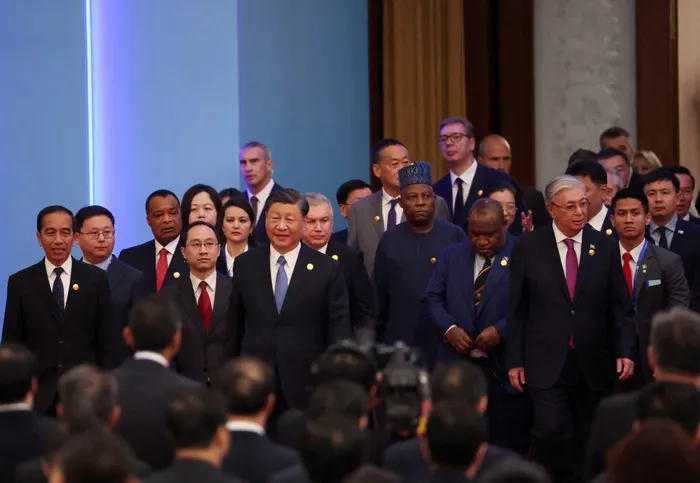BRI: The next phase for projects won’t be business as usual

Picture: Edgar Su / REUTERS / Taken on October 18, 2023 – Chinese President Xi Jinping, centre, and world leaders attended the opening ceremony of the Belt and Road Forum to mark the 10th anniversary of the Belt and Road Initiative (BRI) at the Great Hall of the People in Beijing. The BRI has opened significant economic corridors, including for African nations such as South Sudan and Ethiopia, the writer says.
By Sizo Nkala
In a series of speeches in his first year in power in 2013, Chinese President Xi Jinping conceptualised and fleshed out his vision for what would become known as the Belt and Road Initiative (BRI) – a Chinese-sponsored global infrastructure programme aimed to foster integration and connectivity in the Global South.
Speaking at Kazakhstan’s Nazarbayev University, Xi took his audience down the history lane, reminding them of the Ancient Silk Road – an overland route that connected the Eurasian continent and intensified cultural and economic exchanges and facilitated the movement of people, goods and ideas at a scale and magnitude not seen before.
He proposed building an “economic belt along the Silk Road” through policy co-ordination, improving road connectivity, free-flowing trade, monetary circulation and people-to-people relations.
In another speech, in October 2013, in Indonesia, Xi called for development of the Maritime Silk Road of the 21st century, which would expand maritime trade between China and the South East Asian countries.
Later that month in China, Xi stressed the centrality of the importance of the Silk Road and Economic Belt and the Maritime Silk Road in improving regional interconnection through infrastructure and maintaining stability while speaking at the Peripheral Diplomacy Work Conference.
At the Asia-Pacific Economic Co-operation Summit in Beijing in November 2014, he likened the Silk Road Economic Belt and the Maritime Silk Road of the 21st century to two wings propelling Asia to the skies.
While the BRI was originally limited to Asia, it assumed a global scope through an action plan jointly issued by the National Development and Reform Commission, the Ministry of Foreign Affairs and the Ministry of Commerce in March 2015. This was the first time Beijing acknowledged Africa as part of the BRI, stating that the initiative would connect Asian, European and African countries and encourage mutually beneficial co-operation.
Over the past decade, China has signed BRI co-operation agreements with 152 countries – 49 of them in Africa – and more than 30 international organisations. This laid the ground for a massive roll-out of more than 3,000 infrastructure projects in the transport, energy, maritime, water and sanitation and telecommunications sectors. Seaports, airports, railway lines, high-ways, bridges, dams, power plants, and 4G and 5G wireless networks have been built in countries across Africa, Asia, Eastern Europe, and Latin America under the auspices of the BRI in a bid to improve connectivity, trade and South-South co-operation.
Chinese banks, such as China Development Bank (CDB) and Export-Import Bank of China (Exim Bank), and other institutions, like the Silk Road Fund and the Asia Infrastructure Investment Bank, have availed more than $330 billion (R6 trillion) in funding for infrastructure projects since 2013, Africa received $90bn.
The BRI has opened significant economic corridors namely the China-Pakistan Economic Corridor, the China-Mongolia-Russia Economic Corridor, the New Eurasian Land Bridge, and the Lamu Port, South Sudan, and Ethiopia Transport Corridor to mention a few.
The corridors, many of which are in progress, are having a transformative socio-economic impact in the areas that lie along them and will serve as a foundation for strengthening South-South co-operation and potentially redefining the global economic order.
With fewer stringent conditions, the BRI infrastructure funding was a godsend for African countries that faced a dire infrastructure-financing deficit as Western creditors had largely withdrawn from the Continent.
However, the initiative has faced criticism, pointing to unsustainable debt for poor countries, questionable economic viability, lack of due diligence on the environmental and social impacts of large infrastructure projects, secrecy surrounding the agreements and corruption in the awarding of contracts for projects.
At the recent third Belt and Road Forum for International Cooperation in Beijing, Xi reaffirmed China’s desire to continue with the BRI, announcing that CDB and Exim Bank would have new financing windows of $48.75bn each while $11bn would be injected into the Silk and Road Fund.
Although this is a positive indication that the BRI will continue, the modest amounts show that there will be few giant infrastructure projects that characterised the first phase of the BRI, some of which ran into problems around socio-environmental impact and debt repayment issues.
Moreover, at the forum, Xi announced new dimensions that would improve the BRI. These included focusing on big and small projects, prioritising green development, co-operating in science, technology and innovation, people-to-people exchanges, ensuring the integrity of BRI projects, and strengthening institutional co-operation between BRI countries.
The new elements would ensure that the BRI was more multidimensional by incorporating the economic, social, and environmental impact of the projects before implementation. The inclusion of small livelihood projects would take the BRI directly to the ordinary people who, at times, have been excluded as large projects have been dominated by the elite.
Further, a new secretariat would be set up to manage and co-ordinate BRI projects which would increase efficiency and yield better outcomes.
It looks like it will not be business as usual in the next phase of the BRI. To benefit from the programme, African countries will need to build their project preparation capacities.
Dr Sizo Nkala is a Research Fellow at the University of Johannesburg’s Centre for Africa-China Studies